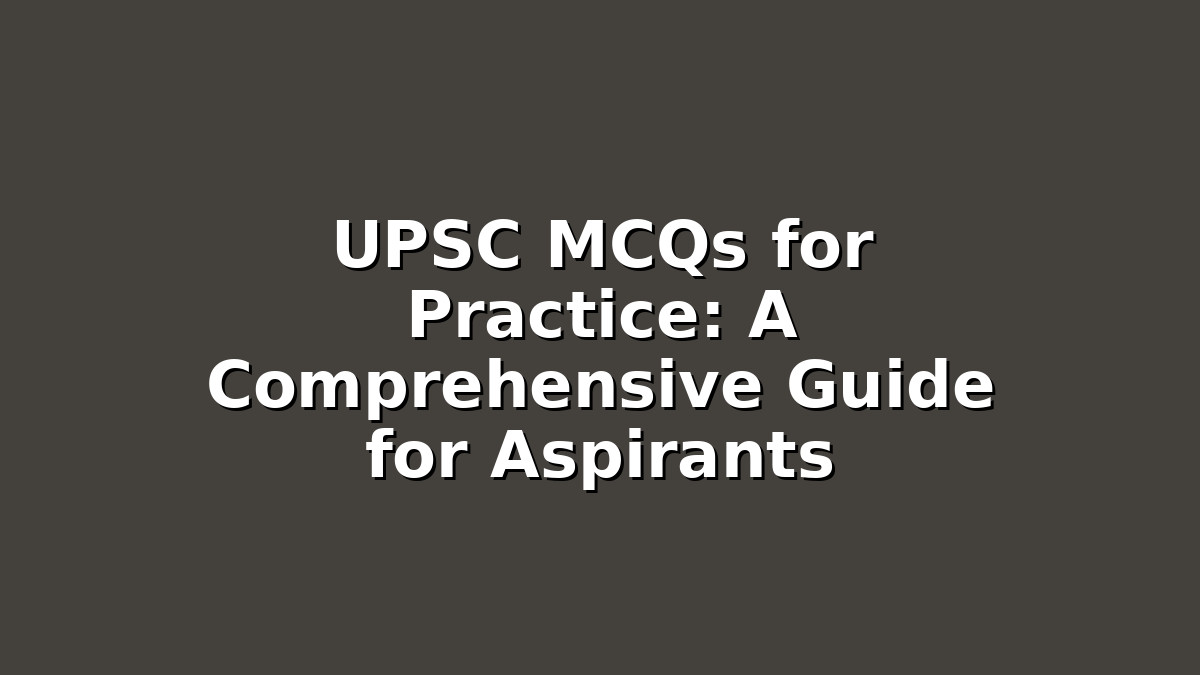Preparing for the Union Public Service Commission (UPSC) exam is a challenging yet rewarding journey. With thousands of candidates competing for a limited number of prestigious government positions, effective preparation is essential. One of the most efficient methods to enhance your understanding and improve exam performance is by practicing UPSC Multiple Choice Questions (MCQs). This article will guide you through the importance of UPSC MCQs, provide strategies to practice them effectively, and offer tips to optimize your study sessions. Whether you are a beginner or already deep into your preparation, these insights will help you boost your confidence and increase your chances of success.
Why UPSC MCQs Are Crucial for Your Preparation
The UPSC Civil Services Exam consists of multiple stages, including the Preliminary exam, which largely focuses on objective questions. MCQs not only test your knowledge but also assess your ability to apply concepts under time constraints. Here are some reasons why practicing UPSC MCQs is indispensable:
– Familiarity with Exam Pattern: The prelims contain two papers—General Studies and CSAT—both comprising MCQs. Regular practice helps you understand the question format, difficulty level, and time management.
– Reinforcement of Concepts: Repeatedly solving questions sharpens your grasp of various subjects such as History, Geography, Polity, Economy, Environment, and Current Affairs.
– Improvement in Speed and Accuracy: With MCQs, it’s not just about knowing the right answer but also selecting it quickly without second-guessing.
– Self-assessment: MCQs provide immediate feedback, helping you identify weak areas and track your progress.
Section 1: How to Integrate UPSC MCQs into Your Daily Study Routine
Incorporating MCQ practice into your study plan can greatly improve retention and understanding. Here are some effective techniques:
– Daily Question Sets: Allocate a fixed time daily—say 30 to 45 minutes—for solving 20 to 30 MCQs on topics you studied that day. This reinforces learning and keeps you in practice mode.
– Topic-wise Practice: Divide your syllabus into segments and focus on one topic at a time. For example, after completing a chapter on the Indian Constitution, attempt MCQs related to the same. This targeted approach helps solidify subject-specific knowledge.
– Use Trusted Resources: Choose MCQ compilations from reputed coaching institutes, UPSC preparation websites, or official sources. Quality questions are crucial for effective practice.
– Review and Analyze: After attempting a set, thoroughly review your answers—even the correct ones. Understand why the correct option is right and why other choices are incorrect. This deepens conceptual clarity.
Section 2: Tips to Maximize the Benefits of Practicing UPSC MCQs
Merely solving questions isn’t enough. How you practice and analyze your attempts can make a significant difference. Here are some tips:
– Simulate Exam Conditions: Occasionally, take full-length MCQ tests within the allotted time. This builds endurance and helps you develop the ability to manage time efficiently during the actual exam.
– Maintain an Error Log: Keep a separate notebook or digital document where you record all the questions you got wrong or found tricky. Regularly revisit this log to avoid repeating mistakes.
– Focus on Conceptual Understanding: Don’t just memorize answers. Use MCQs as a trigger to revisit textbooks or reliable resources to understand underlying principles.
– Group Study Sessions: Discussing tricky questions with peers can provide new perspectives and enhance learning. Join or form study groups that focus on solving and debating MCQs.
– Leverage Technology: Use mobile apps and online platforms that offer UPSC MCQs with instant explanations. Many apps also provide performance analytics, which can guide your preparation strategy.
Section 3: Overcoming Common Challenges with UPSC MCQs
Practicing MCQs can sometimes be overwhelming or ineffective if not approached properly. Here’s how to overcome common hurdles:
– Avoid Guesswork: It’s tempting to guess answers, especially under time pressure. However, aim to answer only when confident or after eliminating unlikely options. This minimizes negative marking.
– Balance Between Speed and Accuracy: While speed is important, accuracy should not be sacrificed. Initially, focus on accuracy; with time practice will naturally improve your speed.
– Managing Large Syllabus: The UPSC syllabus is vast, and it’s easy to feel lost. Break down your preparation into manageable chunks and focus on one segment of MCQs at a time.
– Handling Stress and Fatigue: Take regular breaks and maintain a healthy routine. Avoid burnout by balancing study with relaxation and physical activity.
– Dealing with Negative Marking: Negative marking makes guessing risky. Develop better elimination techniques and focus on strengthening your knowledge to minimize errors.
Conclusion
UPSC MCQs for practice are an indispensable tool for any serious aspirant. By integrating daily question solving into your study routine, analyzing your mistakes, and simulating exam conditions, you can significantly improve your performance. Remember, consistent and smart practice is the key to mastering the UPSC Prelims exam. Stay motivated, be patient with your progress, and keep refining your strategies. With determination and the right approach, success is well within your reach. Happy studying!

Responses